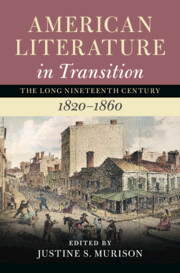Book contents
- American Literature in Transition, 1820–1860
- Nineteenth-Century American Literature in Transition
- American Literature in Transition, 1820–1860
- Copyright page
- Contents
- Figures
- Contributors
- Series Preface
- Acknowledgments
- Chapter 1 Introduction
- Part I Fractures and Continuities
- Part II Forms and Formats
- Part III Authors and Figures
- Chapter 17 Apess/Sedgwick
- Chapter 18 Child/Thoreau
- Chapter 19 Douglass/Walker
- Chapter 20 Emerson/Poe
- Chapter 21 Fuller/Stowe
- Chapter 22 Hawthorne/Winthrop
- Chapter 23 Melville/Whitman
- Chapter 24 Harper/Stewart
- Index
Chapter 19 - Douglass/Walker
from Part III - Authors and Figures
Published online by Cambridge University Press: 09 June 2022
- American Literature in Transition, 1820–1860
- Nineteenth-Century American Literature in Transition
- American Literature in Transition, 1820–1860
- Copyright page
- Contents
- Figures
- Contributors
- Series Preface
- Acknowledgments
- Chapter 1 Introduction
- Part I Fractures and Continuities
- Part II Forms and Formats
- Part III Authors and Figures
- Chapter 17 Apess/Sedgwick
- Chapter 18 Child/Thoreau
- Chapter 19 Douglass/Walker
- Chapter 20 Emerson/Poe
- Chapter 21 Fuller/Stowe
- Chapter 22 Hawthorne/Winthrop
- Chapter 23 Melville/Whitman
- Chapter 24 Harper/Stewart
- Index
Summary
This essay recovers how David Walker’s Appeal to the Coloured Citizens of the World (1829–30) likely played a significant role in Frederick Douglass’s frustrated introduction to literacy in Baltimore. By recognizing this important but overlooked intersection of two generations of Black antislavery activists at a turning point in the movement, the essay complicates our thinking about both the effects of Walker’s fiery Appeal and Douglass’s relationship to violent self-defense and resistance. More broadly, it examines the frequent linkage of print to violence and the politicization of print as a powerful and contested form of activism in the histories of US antislavery and antiracism.
- Type
- Chapter
- Information
- American Literature in Transition, 1820–1860 , pp. 318 - 334Publisher: Cambridge University PressPrint publication year: 2022

